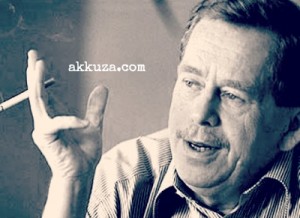I will, in short, dream for a while
 Back in 1992, Vaclav Havel was the President of a reborn Czechoslovakia. The fall of the Wall and the crumbling of the Iron Curtain was still fresh in recent memory and Havel’s new republic was making its way towards the ideal of “Western Democracy”. Fukuyama might be standing round the corner proclaiming the end of history but for the Czechoslovak playwright and poet President the future was full of hope. In the summer of 1992, Havel wrote a series of essays published in a book called “Summer Meditations”. In “Beyond the Shock of Freedom” he tries to imagine what Czechoslovakia would be like in the future (ten, fifteen, or twenty years). Though he admits that “life is unfathomable” he does try to dream for a while.
Back in 1992, Vaclav Havel was the President of a reborn Czechoslovakia. The fall of the Wall and the crumbling of the Iron Curtain was still fresh in recent memory and Havel’s new republic was making its way towards the ideal of “Western Democracy”. Fukuyama might be standing round the corner proclaiming the end of history but for the Czechoslovak playwright and poet President the future was full of hope. In the summer of 1992, Havel wrote a series of essays published in a book called “Summer Meditations”. In “Beyond the Shock of Freedom” he tries to imagine what Czechoslovakia would be like in the future (ten, fifteen, or twenty years). Though he admits that “life is unfathomable” he does try to dream for a while.
It’s not Martin Luther King’s dream. In many ways it is much more down to earth. What we read is a President who hopes to shepherd his newborn Western nation to working the basic tenets of what was understood to be the workings of a western liberal democracy. This was, remember, around the same time as the second mandate of Fenech Adami’s reworking of the Maltese republic – from Work, Justice and Liberty we had segued onto “Solidarity… always… everywhere”. Solidarity was a page lifted straight from the rebirth of another former Iron curtain nation – Walesa’s Poland. It was the call for change that was answered and that began to break away at the shackles of totalitarian hypocrisy.
But back to Havel’s dream. It remains relevant today – and not just for Czechoslovakia (the split into the Czech and Slovak republics occurred a little while after Havel published his thoughts). I find Havel’s hopes for the citizenry particularly telling. What he describes as ‘the shock of freedom’ has impacted the way citizens think and he hopes for an evolution in their attitude. The civic responsibility that he evokes involves confidence and pride – leading citizens to feel comfortable with their own country. Here is an extract from the opening lines of his essay with my emphasis added.
In the first place, I hope the atmosphere of our lives will change. The shock of freedom, expressed through frustration, paralysis and spite, will have gradually dissipated from society. Citizens will be more confident and proud, and will share a feeling of co-responsibility for public affairs.They will believe that it makes sense to live in this country.
Political life will have become more harmonious. We will have two large parties with their own traditions, their own intellectual potential, clear programs, and their own grass-roots support. They will be led by a new generation of young, well-educated politicians whose outlook has not been distorted by the era of totalitarianism. And of course there will be several smaller parties as well.
Our constitutional and political system will have been created and tested. It will have a set of established gentlemanly, unbendable rules. The legislative bodies will work calmly, with deliberation and objectivity. The executive branch of government and the civil service will be inconspicuous and efficient. The judiciary will be independent and will enjoy popular trust, and there will be an ample supply of new judges. […] A well-functioning, courteous police force wioll enjoy the respect of the population, and thanks to it – not only to it – there will no longer be anything like the high crime rate there is now.
At the head of the state will be a grey-haired professor with the charm of a Richard von Weizsacker.
We will, in short, be a stable Central Europen democracy that has found its identity and learned to live with itself.







